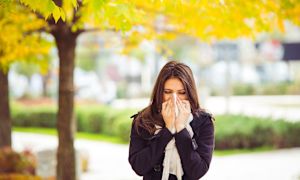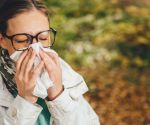Advertisement
This depends on the actual allergic reactions. Typical seasonal allergies to pollen and such things do not tend to worsen with each exposure and in fact can improve as we age. However, if your allergic reaction is an anaphylactic reaction to an allergen, then they can worsen with each exposure and can lead to death. Anaphylaxis is a life-threatening emergency and should be treated as such.
If you have had a known anaphylactic reaction to an allergen, your doctor most likely prescribed you an EpiPen. This is an injection of epinephrine that helps slow the reaction. However, you should immediately report to your nearest emergency room even after using the epinephrine, because your reaction could be worse than the last one. Anaphylaxis occurs when the body reacts to the allergen in a way that is harmful to the patient. Once the body recognizes the allergen, it has the ability to "remember" the allergen and can progressively attack the allergen better. This makes it worse for the patient. In this sense, allergic reactions do worsen each time.
If you have had a known anaphylactic reaction to an allergen, your doctor most likely prescribed you an EpiPen. This is an injection of epinephrine that helps slow the reaction. However, you should immediately report to your nearest emergency room even after using the epinephrine, because your reaction could be worse than the last one. Anaphylaxis occurs when the body reacts to the allergen in a way that is harmful to the patient. Once the body recognizes the allergen, it has the ability to "remember" the allergen and can progressively attack the allergen better. This makes it worse for the patient. In this sense, allergic reactions do worsen each time.
Allergic reactions can be very unpredictable, and reactions do not always increase (or decrease in severity) compared to previous reactions. You may also experience different allergic symptoms to the same allergen, making a connection even more difficult to establish. The nature of a reaction depends on your level of allergy and how much of the allergen you ingested.
Continue Learning about Allergies
Important: This content reflects information from various individuals and organizations and may offer alternative or opposing points of view. It should not be used for medical advice, diagnosis or treatment. As always, you should consult with your healthcare provider about your specific health needs.








